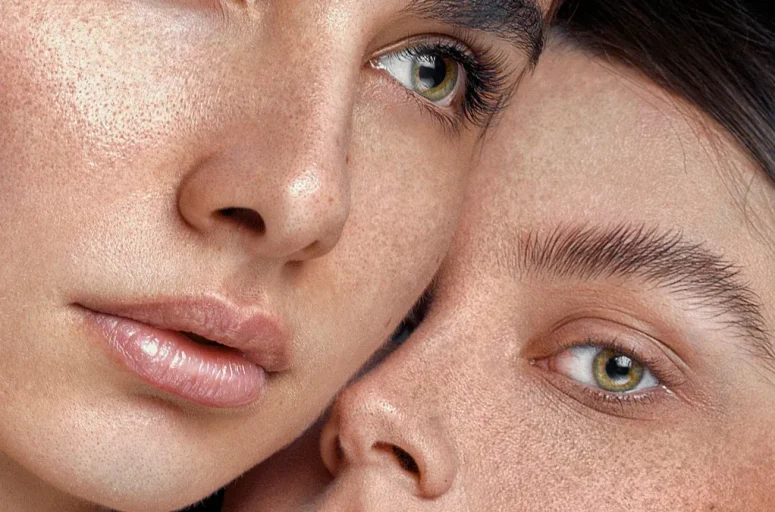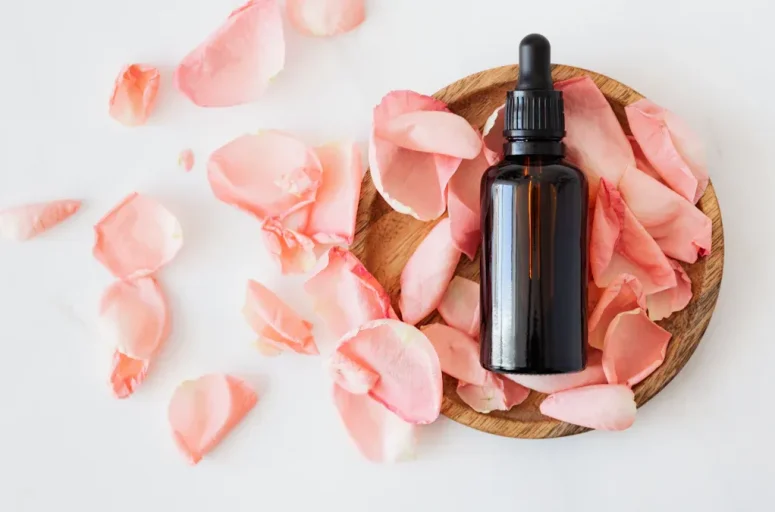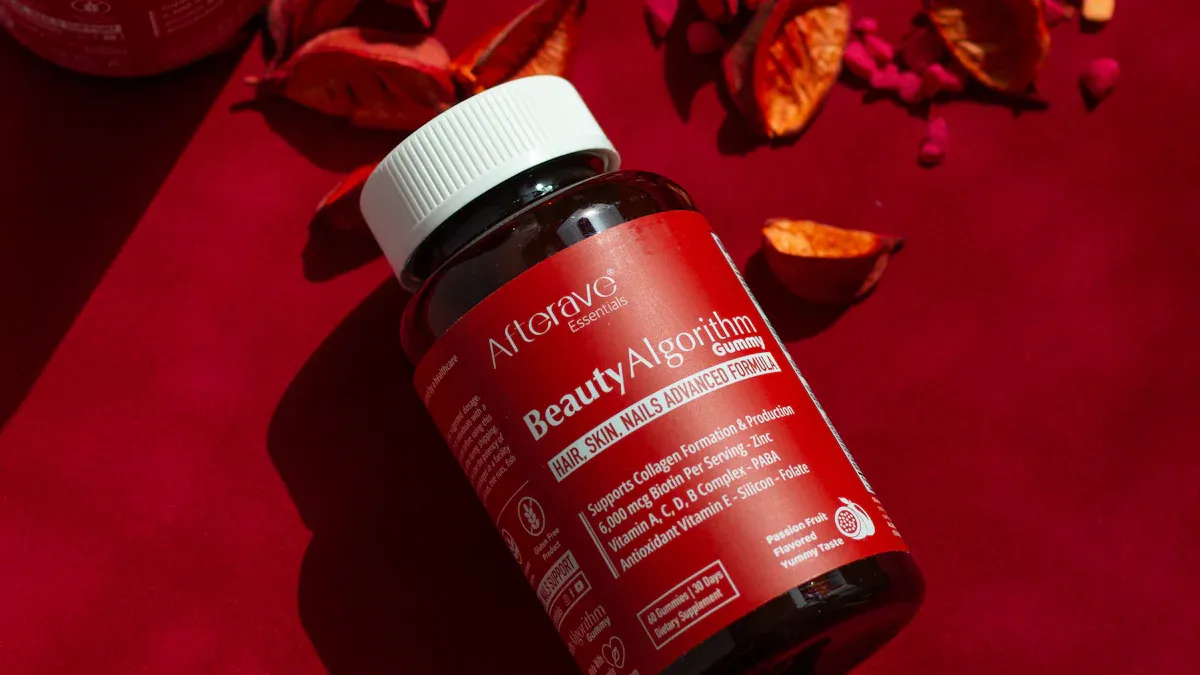
You might know vitamin D as the “sunshine vitamin,” but did you know it’s a game-changer for vitamin D skin health? This nutrient works wonders by boosting your skin’s natural defense. It helps maintain a strong barrier, keeping hydration in and irritants out. Plus, it fights inflammation, which can reduce redness and acne. Vitamin D even promotes collagen production, a must for keeping your skin firm and youthful. Studies show that low vitamin D levels can impact your skin health and may even speed up signs of aging. Keeping your vitamin D levels in check is key to achieving healthy skin.
Key Takeaways
Vitamin D makes your skin stronger by locking in moisture.
It helps calm redness and swelling, which is good for acne.
This vitamin helps your skin make collagen to stay firm.
Not enough Vitamin D can cause dry skin and slow healing.
You can get Vitamin D from sunlight, food, or supplements.
Skincare with Vitamin D can keep skin soft and smooth.
Mixing Vitamin D with Vitamin C and Omega-3 helps skin health.
Using Vitamin D often can keep your skin glowing and young.
The Importance of Vitamin D for Overall Health
Vitamin D’s role in the body
Vitamin D is important for keeping your body healthy. It does more than just help your bones stay strong. This vitamin helps your body absorb calcium and phosphorus. These minerals are needed for strong and healthy bones. Without enough vitamin D, bones can become weak and break easily. But vitamin D does even more.
Studies show that vitamin D helps your immune system fight off illnesses like the flu and tuberculosis. It also helps control your metabolism and keeps your weight healthy.
Here’s a simple look at how vitamin D helps your health:
Health Condition | What Vitamin D Does |
|---|---|
Immune Function | Helps your body fight infections like the flu and tuberculosis. |
Multiple Sclerosis | Higher vitamin D levels lower the risk of getting MS by up to 62%. |
Type 1 Diabetes | Babies who get vitamin D regularly have a 90% lower chance of getting T1D. |
As you can see, vitamin D is very important. It helps your immune system, metabolism, and lowers the risk of some diseases.
How Vitamin D supports skin health
Vitamin D is great for your skin. It helps your skin stay healthy and look good. One way it helps is by making your skin barrier stronger. This barrier keeps moisture in and blocks harmful things out. A strong barrier keeps your skin soft and less dry.
Vitamin D also helps your skin heal faster. If you get a cut or scrape, it helps new skin cells grow. This keeps your skin looking fresh and young.
That’s not all. Vitamin D reduces redness and swelling. This is helpful for people with acne or other skin problems.
Studies prove this. One study showed that taking 1,600 IU of vitamin D3 daily improved eczema in 60 days. Another study found that vitamin D helped kids with winter skin problems feel better.
Here’s a chart showing how vitamin D deficiency affects your body:
By making your skin barrier stronger, helping it heal, and reducing swelling, vitamin D keeps your skin healthy and glowing. It’s an easy way to take care of your skin.
How Vitamin D Helps Your Skin Stay Healthy
Makes the skin barrier stronger
Your skin protects you from germs and keeps moisture in. Vitamin D helps keep this barrier strong and working well. A healthy skin barrier stops dryness and blocks harmful things, leaving your skin soft.
Using vitamin D on your skin can help even more. It boosts ceramides, which are natural fats that lock in moisture. This means less dryness and irritation. If your skin is flaky or sensitive, vitamin D might be what you need.
Helps skin heal and stay fresh
Your skin fixes itself every day from cuts and damage. Vitamin D helps this process by growing new, healthy skin cells. It replaces damaged cells, keeping your skin looking young and bright.
Here’s how vitamin D helps your skin heal:
It protects your skin from damage that causes aging.
It helps new skin cells grow faster to heal wounds.
It keeps your skin’s genes working the right way.
It lowers swelling, which slows healing.
It makes your skin stronger against harm.
Using a vitamin D cream at night can help even more. It gives your skin what it needs to fix itself while you sleep.
Calms redness and fights acne
Redness, irritation, and acne are caused by swelling. Vitamin D can calm your skin and reduce these problems. Studies show vitamin D lowers swelling a lot. In one study, people taking vitamin D had 34.6% less acne after two months.
Vitamin D creams also help with acne. They stop pores from clogging and lower acne-causing molecules. This means fewer pimples and less redness. If acne is a problem, try adding vitamin D to your routine.
By making your skin barrier stronger, helping it heal, and calming swelling, vitamin D is great for your skin. Whether you use it in creams, pills, or sunlight, it’s an easy way to keep your skin healthy.
How Vitamin D Slows Premature Aging
Shields skin from free radical harm
Your skin faces threats from free radicals daily. These harmful molecules come from pollution, sunlight, and the environment. They damage skin cells, causing dullness, dark spots, and aging signs. Luckily, vitamin D helps by stopping these harmful molecules.
Think of vitamin D as your skin’s shield. It strengthens your skin’s defenses against damage. This means fewer free radicals harming your skin and more time for it to stay healthy.
Fun fact: Free radicals are a major cause of early aging. Keeping your vitamin D levels balanced helps your skin fight back.
Helps make collagen and elastin
Collagen and elastin keep your skin firm and smooth. As you get older, your body makes less of these proteins. This can lead to sagging and wrinkles. Vitamin D helps your body produce more collagen and elastin.
Vitamin D works to strengthen your skin and improve its bounce. With enough collagen and elastin, your skin looks fuller and feels tighter.
Adding vitamin D to your life can really help. You can get it from sunlight, food, or supplements. This nutrient keeps your skin strong and youthful.
Softens fine lines and wrinkles
Wrinkles and fine lines happen as you age, but vitamin D can slow them down. It helps your skin replace old cells with new ones. This smooths out lines and keeps your skin fresh.
Vitamin D also keeps your skin hydrated. Dry skin makes wrinkles stand out more. With enough vitamin D, your skin stays soft and smooth. This makes lines less visible and your face look better.
Tip: Use vitamin D with a good moisturizer. Together, they keep your skin hydrated and youthful.
By protecting your skin, boosting collagen, and reducing wrinkles, vitamin D helps slow aging. It’s an easy way to keep your skin glowing and young.
Identifying Vitamin D Deficiency and Its Impact on Skin
Common signs of Vitamin D deficiency
Do you feel tired or notice dull skin? These might mean you lack vitamin D. Without enough vitamin D, your body shows warning signs. You could feel weak, have bone pain, or feel sad. Your skin often shows the first signs of trouble.
For example, people with darker skin need more sunlight to make vitamin D. Studies show that skin color and genetics can affect vitamin D levels. This is worse in places with little sunlight or during winter.
Here’s a simple chart about vitamin D deficiency in different groups:
Group | Deficiency Rate | Notes |
|---|---|---|
Middle Eastern Young Adults | 72.8% | Women (83.9%) have higher rates than men (48.5%). |
Elderly Black People in Boston | 73% | Higher than 35% in elderly non-Hispanic Whites. |
Healthy Black Women < 50 years | 40% | Much higher than 4% in White women of the same age. |
Nursing Home Residents | 60% | Common among people living in care facilities. |
Hospital Patients | 57% | A big issue in hospitals. |
Young Adults in Boston (Winter) | ~66% | Found to lack enough vitamin D by winter’s end. |
U.S. Population (NHANES) | 2.6% (severe), 22.0% (moderate), 40.9% (insufficient) | Rates depend on how deficiency is defined. |
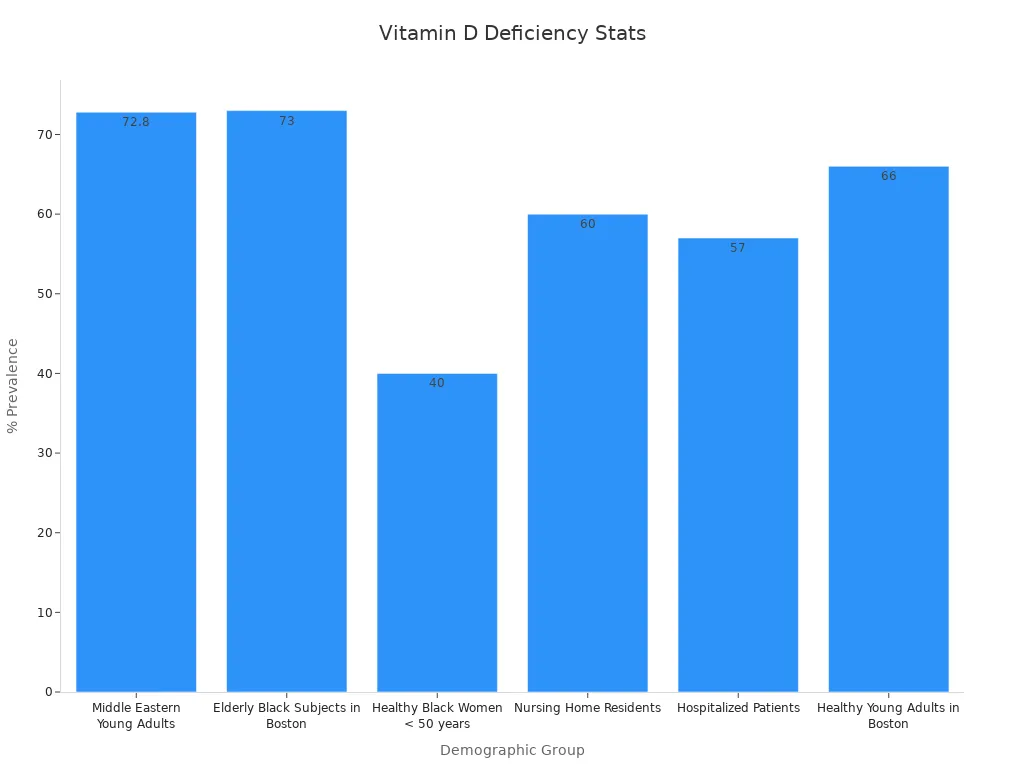
Effects of deficiency on skin health
Low vitamin D can harm your skin. It weakens your skin’s barrier, making it lose moisture. This causes dryness, flaky skin, and irritation. Cuts and wounds also heal slower without enough vitamin D.
Low levels can cause swelling, making acne, eczema, or psoriasis worse. If you have redness or breakouts, check your vitamin D levels.
Long-term consequences of low Vitamin D levels
Ignoring low vitamin D can hurt your skin and health over time. Your skin may lose its firmness and get more wrinkles. Dryness and swelling can speed up aging, making your skin look older.
It’s not just about looks. Long-term vitamin D deficiency weakens your immune system. This makes your skin more likely to get infections. It also raises the risk of serious problems like weak bones and heart disease.
To avoid these problems, keep your vitamin D levels healthy. Eat foods rich in vitamin D, spend time in sunlight, or take supplements. This helps your skin and body stay strong and healthy.
Practical Ways to Boost Vitamin D Levels
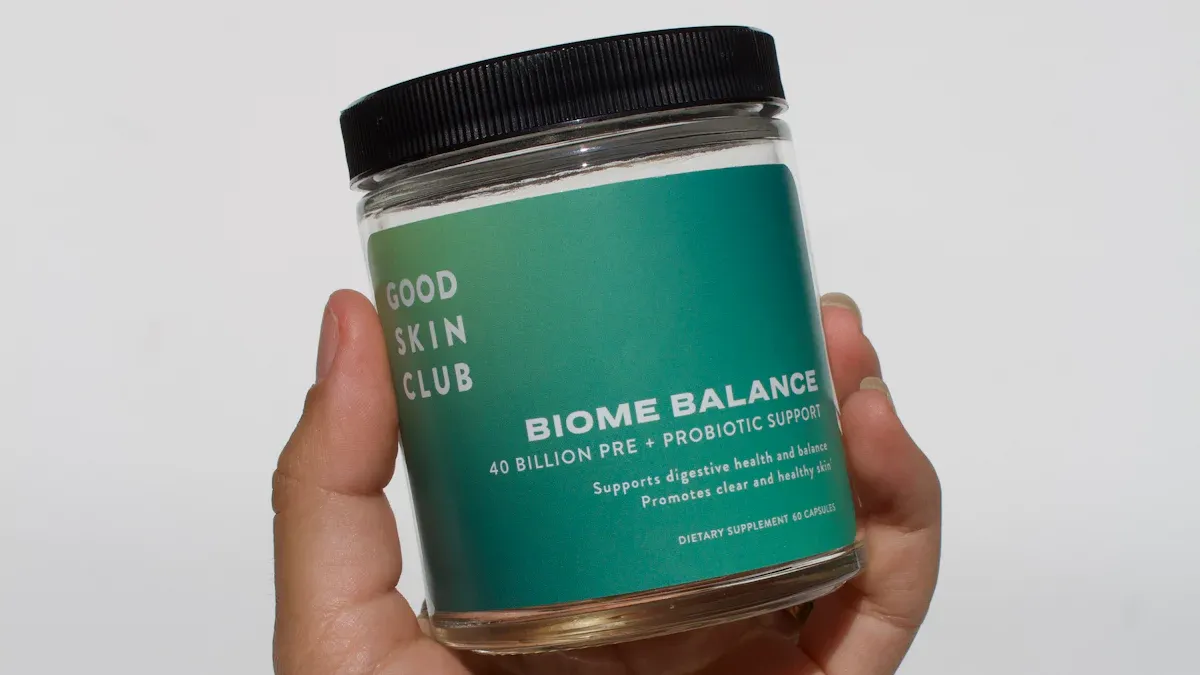
Foods that have a lot of Vitamin D
Eating the right foods is a simple way to get vitamin D. Some foods naturally have it, while others are made to include it. Fatty fish like salmon, tuna, and mackerel are great choices. A small piece of salmon, about 3 ounces, gives you up to 570 IU of vitamin D. Egg yolks and beef liver also have small amounts of this vitamin.
Don’t like fish? That’s okay! Foods like milk, orange juice, and cereals often have added vitamin D. Mushrooms are another good option, especially if they’ve been in sunlight.
Tip: Eat vitamin D foods with healthy fats like avocado or olive oil. This helps your body use the vitamin better.
How sunlight helps make Vitamin D
Your body makes vitamin D when your skin gets sunlight. UVB rays from the sun help your skin create this important nutrient. Just a few minutes outside can make a big difference.
How much time you need depends on the season, your skin color, and where you live. Here’s a table to help:
Season | Skin Showing | Time for Sunburn Risk | |
|---|---|---|---|
Summer/Spring | 22% | 10-15 minutes | 9-46 minutes |
Autumn/Winter | 8-10% | Up to 6.5 hours | N/A |
It’s easier to get vitamin D from the sun in summer and spring. In winter, you might need more food or supplements to help.
Tip: Protect your skin after getting sunlight. Use sunscreen to avoid damage.
Why Vitamin D supplements are helpful
Sometimes, food and sunlight aren’t enough to get all the vitamin D you need. Supplements can help fill the gap. They’re especially useful if you don’t get much sun or have a limited diet.
Studies show that vitamin D3 works better than D2 for raising vitamin levels. D3 is almost 10 times stronger over 28 days. Taking your supplement with a meal that has at least 15 grams of fat can help your body absorb it better by 50%.
Here’s a quick look at vitamin D research:
Study Type | What It Found |
|---|---|
Systematic Review | D3 raises vitamin D levels better than D2. |
Comparative Study | |
Meal Timing Study | Taking vitamin D with meals boosts absorption by over 50%. |
Supplements are great for people who don’t get enough sun or have food restrictions. They’re an easy way to keep your skin and body healthy.
Note: Talk to your doctor before starting any supplement to make sure it’s safe for you.
Skincare products with Vitamin D
Have you thought about adding vitamin D to your skincare? Many products now include this nutrient, and they’re worth trying. Skincare with vitamin D helps keep your skin soft, smooth, and youthful. These products deliver vitamin D straight to your skin for a healthy boost.
One option is vitamin D creams. They lock in moisture and strengthen your skin’s barrier. If your skin feels dry or irritated, these creams can help. They keep your skin hydrated, making it soft and plump.
Another choice is serums. They are light and absorb quickly, so they’re great under moisturizer. A vitamin D serum can reduce redness and brighten dull skin. It calms irritation and improves your skin’s glow.
Face masks with vitamin D are also available. They’re perfect for relaxing after a busy day. These masks soothe tired skin and add a healthy shine. It’s like giving your skin a spa day at home.
For multitasking, try moisturizers or sunscreens with vitamin D. These products hydrate or protect your skin while adding the benefits of vitamin D. They’re an easy way to improve your routine without extra steps.
When picking a product, check the label. Look for “cholecalciferol” or “ergocalciferol,” which are types of vitamin D. Also, choose products that match your skin type. If your skin is sensitive, pick something gentle and soothing.
Adding vitamin D skincare is simple. Use these products regularly for the best results. Whether you have dryness, redness, or early aging signs, they can help. Your skin will feel and look better with this extra care!
Tip: Combine vitamin D skincare with a good diet and sunlight. This mix is great for your skin’s health and glow.
Tips for Keeping Your Skin Youthful with Vitamin D
Mix Vitamin D with other helpful nutrients
Vitamin D works better with other nutrients that help your skin. For example, vitamin C brightens your skin and helps make collagen. Together with vitamin D, it keeps your skin firm and young. Omega-3 fatty acids are also great. They keep your skin moist and lower redness or swelling.
Zinc is another good match for vitamin D. It helps your skin heal and makes its barrier stronger. These nutrients work as a team to keep your skin glowing and healthy. To get these benefits, eat foods like salmon, oranges, nuts, and seeds. You can also find skincare products that mix these ingredients for extra care.
Tip: Eat vitamin D foods with healthy fats like avocado. This helps your body use the vitamin better.
Follow a complete skincare routine
A good skincare routine is more than just products. It includes your diet, stress levels, and natural remedies. Adding vitamin D to this routine can really help. Here’s how:
It lowers swelling, helping with eczema or psoriasis.
It protects your skin by keeping cells healthy.
It fights damage from the environment and slows aging.
It helps your skin shed old cells and stay fresh.
Use natural products with vitamin D, like creams or serums. Pair them with relaxing activities like yoga to reduce stress. Less stress can make your skin healthier. A balanced lifestyle with vitamin D keeps your skin glowing and strong.
Benefit | What It Does |
|---|---|
Healthy Lifestyle | Combines food, habits, and care for better skin. |
Natural Products | Uses gentle, natural skincare for healthier results. |
Stress Relief | Lowers stress, which helps your skin look better. |
Be regular with Vitamin D
Your skin needs vitamin D every day to stay healthy. Make it a habit to get enough. Spend a little time in the sun, eat foods with vitamin D, or take a supplement if needed.
If you use vitamin D skincare, apply it often. For example, use a cream at night or a serum in the morning. This gives your skin what it needs to heal and stay smooth. Over time, you’ll see softer, brighter skin.
Reminder: Always protect your skin in the sun. Use sunscreen to avoid damage while getting your vitamin D.
By mixing vitamin D with other nutrients, following a full routine, and being consistent, you can keep your skin glowing and youthful for a long time.
Vitamin D is important for keeping your skin healthy and young. It makes your skin barrier stronger, protecting it from germs and damage. It also helps reduce redness and swelling, which can improve acne, eczema, and psoriasis. Vitamin D works as an antioxidant, fighting harmful molecules and slowing down wrinkles.
Here’s how Vitamin D helps your skin:
Benefit | What It Does |
|---|---|
Builds a strong skin barrier | Protects against germs, toxins, and harmful things from the environment. |
Helps with acne and skin issues | Lowers redness and swelling; helps with eczema, psoriasis, and vitiligo. |
Slows skin aging | Fights harmful molecules to reduce wrinkles and keep skin smooth. |
To get these benefits, focus on getting enough Vitamin D. Eat foods with it, spend time in sunlight, or take supplements. Your skin will look brighter and feel healthier.
FAQ
1. How much Vitamin D do you need daily?
The recommended daily amount varies by age and lifestyle. For most adults, 600-800 IU is enough. If you’re deficient, your doctor might suggest more.
Tip: Check with a healthcare provider to find the right dose for you.
2. Can you get too much Vitamin D?
Yes, taking too much can cause problems like nausea or kidney issues. Stick to the recommended dose unless advised otherwise.
Note: Avoid exceeding 4,000 IU daily unless prescribed.
3. Does sunscreen block Vitamin D production?
Sunscreen reduces Vitamin D production but doesn’t stop it completely. You can still get some Vitamin D while protecting your skin from harmful UV rays.
4. What foods are best for Vitamin D?
Fatty fish like salmon, fortified milk, and egg yolks are great sources. Mushrooms exposed to sunlight also provide Vitamin D.
Pro Tip: Pair Vitamin D-rich foods with healthy fats for better absorption.
5. Can Vitamin D improve acne?
Yes, Vitamin D reduces inflammation and helps regulate oil production. It can calm redness and prevent clogged pores, which may improve acne.
6. How long should you stay in the sun for Vitamin D?
Around 10-15 minutes of sun exposure on your arms and legs a few times a week is usually enough. This depends on your skin tone and location.
7. Are Vitamin D supplements safe?
Supplements are safe when taken as directed. They’re especially helpful if you don’t get enough sunlight or Vitamin D-rich foods.
Reminder: Always consult a doctor before starting supplements.
8. Can Vitamin D slow aging?
Yes, Vitamin D boosts collagen production and protects against free radicals. This helps reduce wrinkles and keeps your skin firm and youthful.
Fun Fact: Healthy Vitamin D levels can make your skin glow!
